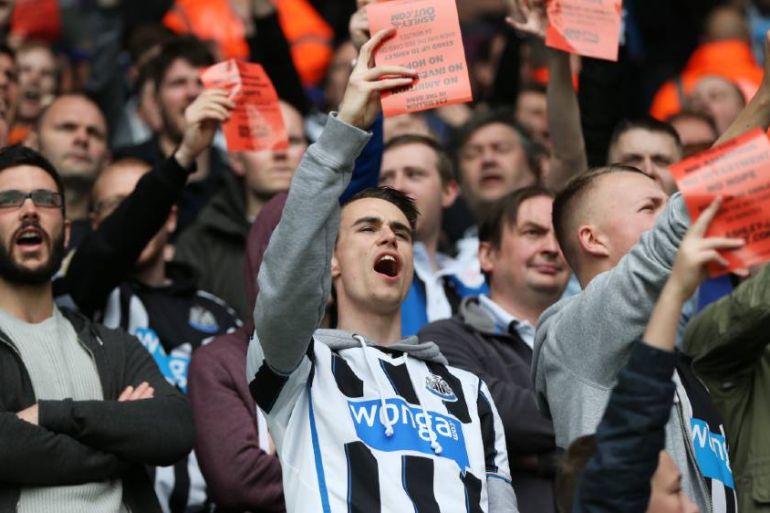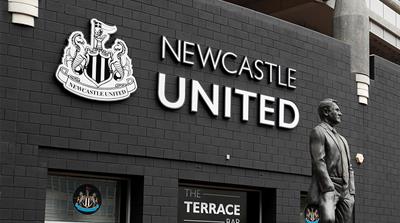Could Saudi Arabia’s mass scale IP theft sink Newcastle bid?
The final whistle may blow on Saudi-led bid for Newcastle United takeover after WTO rules against kingdom.

London, United Kingdom – Football is about the love of the game and fair, sportsmanlike competition. Beyond that essence, however, it is also very much about money.
Newcastle United fans have been watching anxiously to see whether their beloved football club will be taken over by a British consortium backed by the deep pockets of Saudi Arabia’s sovereign wealth fund.
Keep reading
list of 4 itemsEcuador weighs security, international arbitration in latest referendum
‘Triple spending’: Zimbabweans bear cost of changing to new ZiG currency
Boeing hit with 32 whistleblower claims, as dead worker’s case reviewed
The result may not be what they were hoping for.
On Tuesday, the World Trade Organization (WTO) published its ruling against Saudi Arabia, following an 18-month investigation into TV broadcasting piracy – and the conclusion – that the kingdom had engaged in Intellectual Property theft on a mass scale, could sink the Saudi-backed Newcastle bid.
‘Nothing to do with politics’
The WTO complaint had been brought by Qatar, ostensibly on behalf of the Doha-based beIN Sports network, whose television feed has been hacked and rebroadcast by the Riyadh-based beoutQ pirate station for the past three years.
BeoutQ has illegally shown Premier League matches, various World Cup matches, tennis matches and much more – all broadcasting for which beIN had paid millions of dollars to broadcast exclusively in the region.
BeoutQ set-top boxes have also proliferated across Europe and beyond, costing broadcasters dearly.
But, while this may be seen as merely the latest chapter in the long-running feud between Saudi Arabia and Qatar, the complaint is not confined to the Middle East. The illegal broadcasting undermined the entire funding structure of European football, said complainants, and Qatar’s case was supported by the English Premier League – home of Newcastle United – as well as the European Union, Canada, Japan, Singapore, Brazil and Australia, not to mention FIFA, UEFA, LaLiga, Bundesliga and many others.
“To be clear, this case is nothing to do with politics – it is [intellectual property] theft on a mass scale, and beoutQ’s victims include everyone from Wimbledon, F1, NFL, NBA, FIFA, UEFA, broadcasters beIN, Sky [and the] BBC,” read a legal summary of the WTO ruling prepared by beIN Media Group.

Acting inconsistently with its own decisions
Those hoping the WTO would not touch on the proposed $370m takeover of Newcastle led by the Saudi Public Investment Fund (PIF) will be disappointed.
Should The Premier League approve the Newcastle takeover by KSA, it would be “acting inconsistently with its own decisions and factual evidence as part of the WTO proceedings and also its submissions to the US government, the European Commission and others over the past three years,” reads the legal summary.
“The WTO has conclusively ruled that the government of Saudi Arabia has actively promoted and supported the beoutQ pirate operation since the beginning and has wholly breached, and is breaching, its obligations under international law to protect intellectual property rights,” the summary adds.
That could be a big problem for Saudi Arabia’s sovereign wealth fund.
Those seeking to buy a Premier League football club must pass a test issued by the League to prove they are fit and proper owners and directors.
The Premier League approved the sale of Manchester City to a company ultimately owned by Mansour bin Zayed al-Nahyan, the deputy prime minister of the United Arab Emirates (UAE), a country that has been called out by activists for its human rights abuses. It also greenlit the purchase of Sheffield United by Abdullah bin Musa’ad bin Abdulaziz Al Saud, a member of the Saudi royal family.
But piracy hits the Premier League in its wallet, and it may look less favourably upon the sale of a club to a state-controlled investment fund when that very state has been found guilty of breaching international law by stealing intellectual property (with a cost to broadcasters, the main funders of the League, estimated by beIN Media Group at more than $1bn as of October 2018) – and which the League itself has made several legal representations against.
The Owners’ and Directors’ Test outlines the things which might disqualify someone from owning a club. You cannot be declared bankrupt, or own another Premier League club, for example.
Some benchmarks are absent from the test. It is taken as a given for example that owners would respect human rights, and not lock up activists promoting basic rights for women or execute political prisoners, so there is no clause in the test dealing with respect for human dignity.
But, having a criminal conviction “imposed by a court of the United Kingdom or a competent court of foreign jurisdiction … in respect of any offence involving any act which could reasonably be considered to be dishonest” is enough to disqualify a bid.
One of the offences specifically mentioned in the Premier League handbook is “dishonestly receiving a programme broadcast from within the UK with intent to avoid payment”.
“The piracy complaint is on the one hand quite separate from the human rights concerns surrounding this bid, but there is commonality in the sense that this is essentially about Saudi Arabia’s aggressive disregard for rules and regulations,” Nick McGeehan, a former senior Gulf researcher at Human Rights Watch (HRW), and now director of FairSquare Projects, an NGO that works on human rights abuses in the Gulf and elsewhere, told Al Jazeera
“Whether it’s looking to undermine a rival state or silence a women’s rights activist, Saudi Arabia under Mohammed Bin Salman‘s rule will use all the vast power at its disposal to enforce its will. The big question for the Premier League is whether they want a rogue state like that as part of their business.”
The English Premier League, contacted by Al Jazeera, declined to comment on both the WTO ruling and the planned takeover bid. The PIF and Newcastle United, meanwhile, failed to respond to requests for comment for this report.
The big question for the Premier League is whether they want a rogue state like that as part of their business
Blocked legal actions
The case was taken to the WTO after courts in Saudi Arabia blocked nine legal actions taken by the Premier League, FIFA and others.
The Saudi government had actively supported beoutQ’s piracy from its inception, including during the 2018 FIFA World Cup, when the government sponsored no fewer than 294 public screenings across the country’s 13 regions, according to the legal summary of the ruling.
In addition, the Saudi state failed to take any action against a series of criminal and civil offences committed by beoutQ over the course of three years.
“Throughout the history of the game, there have been things you could get away with,” Uri Levy, world football analyst at BabaGol told Al Jazeera.
“Before yellow cards were introduced, you could get away with a hard foul; you could stand in the box for 90 minutes before the offside rule came in; before VAR, you could score with your hand; and in modern football, you simply can’t get away with violating broadcasting rights.
“There is so much money and influence on the table that if you play this game you are aiming to make enormous amounts of money, but you’re also taking a serious risk. Illegal live streams are being tracked down by the second, and are mostly created by people with little to lose trying to make a few extra pounds from their basement. But if you are a state funding piracy, that’s simply an own goal if you have bigger plans in the football industry.
“Pirate football broadcasts could be the own goal that has cost the Saudis the title.”
Pirate football broadcasts could be the own goal that has cost the Saudis the title
Saud al-Qahtani, previously described as “the Saudi Steve Bannon” and former right-hand-man to Crown Prince Mohammed Bin Salman (MBS), the de facto ruler of Saudi Arabia and the chairman of the Public Investment Fund, promoted beoutQ in a series of governmental tweets.
He was later named as the architect of the murder of journalist and United States resident Jamal Khashoggi.
BeoutQ was hosted on frequencies transmitted by satellite provider Arabsat (an entity with a Saudi CEO, majority-owned by the Saudi government, headquartered in Riyadh and which has ignored hundreds of take-down notices from The Premier League, FIFA, UEFA, beIN, other broadcasters, and many others including Qatar), according to the legal summary of the ruling.
For the first time in the 73-year history of the WTO and its predecessor (the General Agreement on Tariffs and Trade or GATT) it dismissed a defence of “national security”. Riyadh had attempted to invoke a national security exception, but “theft of TV rights has nothing to do with a country’s national security, it is commercial theft, which in this case has continued for three years and is continuing”, said the legal summary.
Saudi Arabia can still, in theory, appeal against the WTO’s ruling, despite the emphatic language appearing to offer little room for the decision to be reversed.
Riyadh has also indicated that any show of complying with the ruling will be tokenistic, said the WTO, but it may have little choice if it wants to own a football club, launch a legitimate football TV network – or play any larger global role in the world of sport.